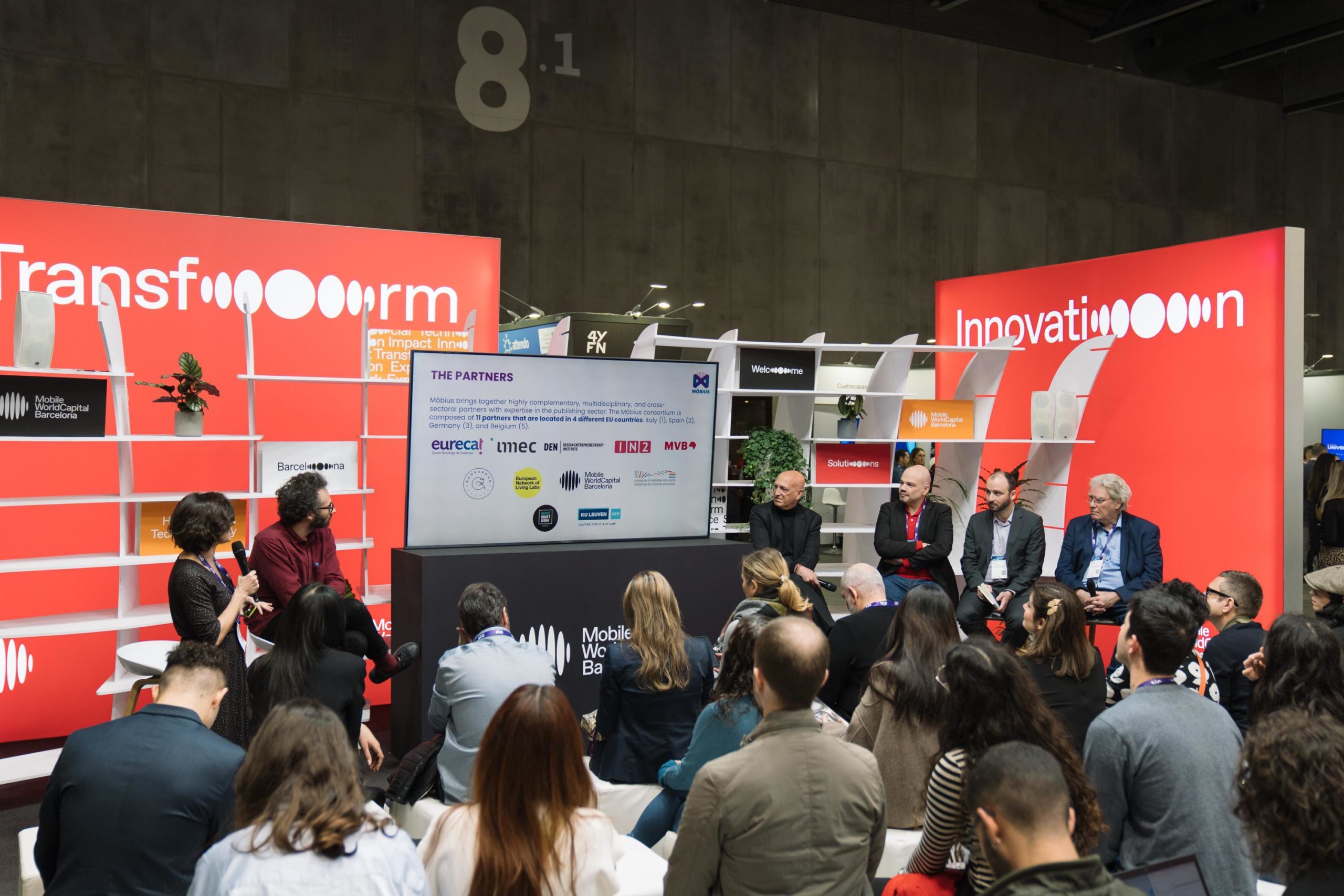- The European project concludes after 3 years of innovation in the editorial industry during the principal technological congress in Southern Europe.

February 28, 2024
The European Commission drives innovation in cultural and creative industries. One of the projects benefiting from this initiative has been Möbius, a project funded by the Horizon 2020 program, being part of the technological forefront promoted by Europe in the publishing sector. Möbius has marked its culmination at the Mobile World Congress 2024 in Barcelona, where it showcased immersive technology solutions designed to enhance reading experiences. Over the event’s four days, the project attracted attendees at the 4YFN area, at the Mobile World Capital Barcelona stand (Hall 8.1, 8.1B55), thus consolidating three years of innovation and dedication in the field.
Industry experts and members of the Möbius consortium gathered for a roundtable discussion at the 4YFN stand to highlight the technologies developed in the project. They contextualized the European cultural and creative landscape and presented the role Möbius solutions could play in the future of the publishing sector.
Marjorie Grassler, Project Manager at Mobile World Capital Barcelona, moderated the session. After an initial project introduction, Richard Elelman, Policy Manager at EURECAT in Barcelona and co-director of the RENAISSANCE Science-Art-Sustainability program, emphasized the role of the European Commission in creative and cultural industries:
“In Europe, the publishing sector represents a substantial market, generating 36 to 38 billion euros annually and employing over half a million people. With 575,000 titles published just last year, embracing digital transformation is imperative. Transitioning to a digital and sustainable economy requires two key shifts: firstly, to enhance digital capabilities for broader reach, and secondly, to uphold the European Commission’s vision of facilitating widespread access to the diverse wealth of European literature, including poetry, theater, and essays. A digital transition holds the promise of accommodating both these critical aspects.”
Julià Vicens, Head of Computational Social Sciences at Eurecat, narrowed down the topic and provided an overview of the use of digital technologies and artificial intelligence in the cultural sector and the potential of prosumers:
“Through innovative approaches, Möbius has utilized new technologies such as immersive experiences, AI, and data analysis throughout the project. The concept of prosumers has been central to this initiative. These are individuals who create and consume content simultaneously. We particularly value fanfiction communities, which develop original stories within well-known universes like Harry Potter. Our commitment lies in empowering these creative circles by offering new tools for content creation and consumption.”
Alexandru Stan, Innovation Projects Manager at IN2 Digital Innovations, reflected on the strategies and benefits of integrating Möbius technologies into the publishing sector. Followed by Enrico Turrin, Deputy Director of the Federation of European Publishers, who reviewed the latest trends in the publishing industry, emphasizing topics such as audiobooks, the impact of social media, and immersion. Finally, Markus Loëffler, founder of Kunstkraftwerk Leipzig, shared the creative process in creating immersive reading experiences and contributions to the industry now that Möbius is coming to an end.
Throughout the four days of the fair, Möbius showcases applications such as the Möbius Book, including the Möbius Book Player and the Möbius Book Creator, as well as the Prosumers Intelligence Toolkit, at stand 8.1B55 in Hall 8.1 (4YFN). It also shares with visitors the Möbius VR Experience, an 8-minute 360º demonstration of an experience that allows reading a book in an enriched way that complements traditional reading habits. It is based on “The Influence of Blue,” the Italian novel by Giulio Ravizza, published by Bookabook in 2019 (a consortium member), and “Fantasy into Möbius,” the manuscript by Filippo Rubulotta that won the project’s 2022 call to encourage both professional and amateur writers to participate in the Möbius Book. The VR experience was created by Franz Fischnaller, Media Artist, and Rupert Huber, Sound Designer, and produced by Kunstkraftwerk Leipzig (a consortium member of Möbius).
About the Project
Möbius is an initiative funded by the European Commission’s Horizon 2020 program aimed at innovating within the European publishing sector by reshaping traditional value chains and business models, uncovering prosumer potential, and offering new enriched reading experiences. It consists of 11 partners located in 4 different EU countries: Italy (Bookabook), Spain (Eurecat, Mobile World Capital Barcelona), Germany (MVB, IN2, KKW), and Belgium (IMEC, KU Leuven, ENoLL, DEN Institute, Federation of European Publishers).
Stay up to date about everything
Subscribe to stay up to date with the latest content from Mobile World Capital Barcelona.
